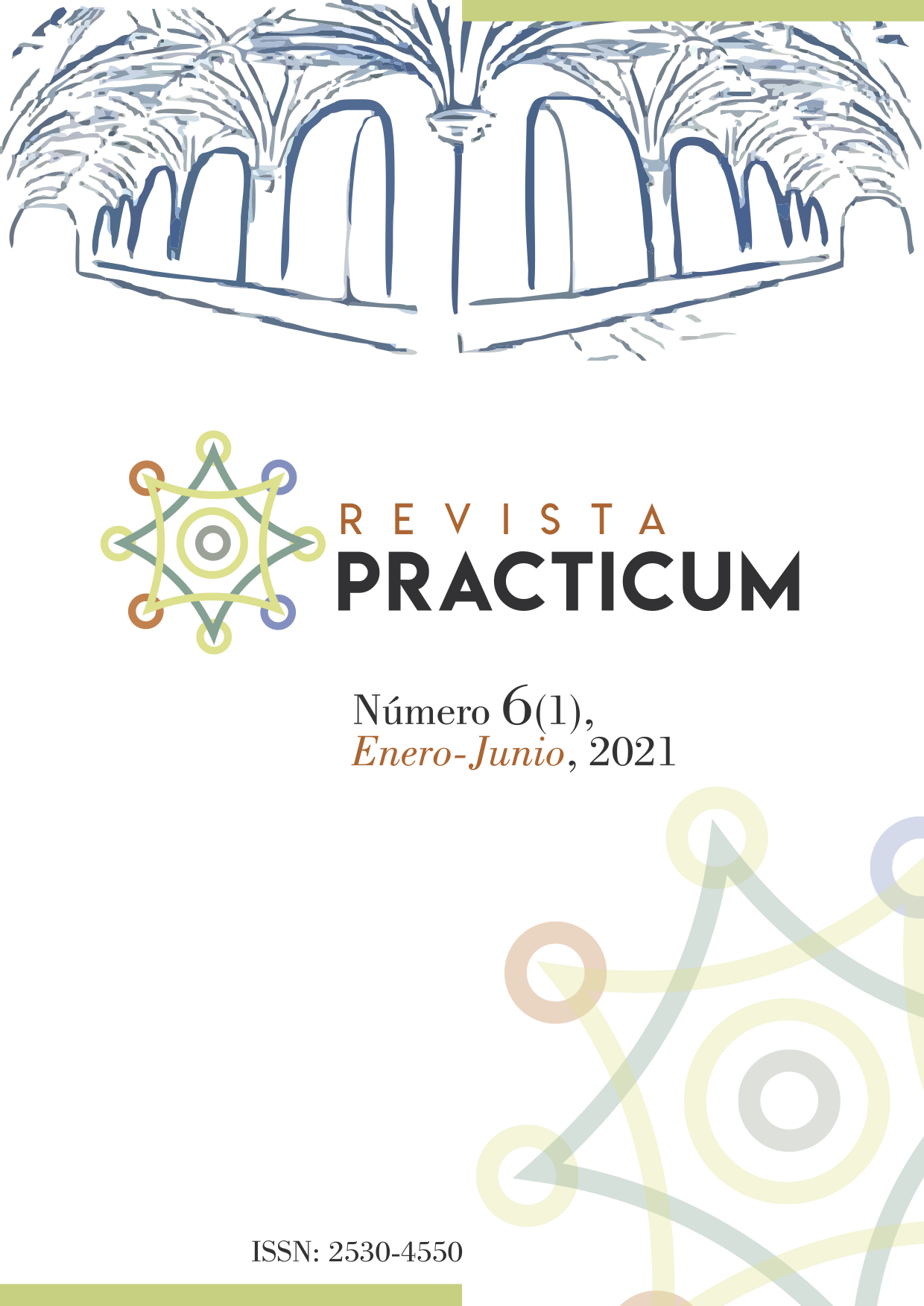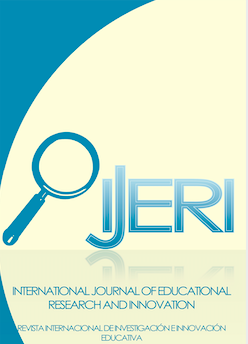Supervised educational practice in daycare: A piklerian experience in a portuguese context
Supervised educational practice in daycare: A piklerian experience in a portuguese context
DOI:
https://doi.org/10.24310/RevPracticumrep.v6i1.10194Keywords:
Daycare, Pikler Triangle, Practicum, Profesional trainingAbstract
The daycare center is an educational context where significant learning opportunities must be created in the lives of babies and children. This article intends to emphasize an educational perspective for daycare education, the perspective of Emmi Pikler, and its contribution in training processes within the supervised educational practice of a professionalizing master's degree, in the Portuguese context. It aims to describe and analyze the experimentation of the Pikler Triangle in the context of a practicum developed in a daycare center, with simultaneous attention to the effects of this pedagogical proposal on children's experience and on the professional learning of the students. With regard to the first, there are positive effects in terms of children's autonomy, interactions and emotional experience, while in relation to the second, the formative contribution is highlighted at the level of a contextualized, participative, sensitive and attentive observation, and by an awareness about the particularities of professional action with younger children, especially in assuming a non-interfering role.
Downloads
Metrics
References
Araújo, S. (2017). Perspetivas pedagógicas para a educação em creche: princípios convergentes e implicações para a prática. Cadernos de Educação de Infância, 112, 104-112.
Bakhurst, D., & Shanker, S. G. (Eds.). (2001). Jerome Bruner: Language, culture and self. Sage.
Bertram, T. & Pascal, C. (2009). Desenvolvendo a Qualidade em Parcerias – Estudos de Caso. Ministério da Educação.
Bogdan, R., & Biklen, S. (1994). Investigação Qualitativa em Educação - Uma Introdução à Teoria e aos Métodos. Porto Editora.
Bruner, J. (1999). Para uma Teoria da Educação. Relógio D'Água Editores.
David, M., & Appell, G. (2010). Lóczy, una insólita atención personal. (3ª ed.). Octaedro Editora.
El «Laberinto» Pikler (s.d.). Pikler-Lóczy: Eusksal Herriko Elkartea. https://url.gratis/GIHdx.
Estrela, A. (1990). Teoria e prática de observação de classes: uma estratégia de formação de professores. Instituto de Investigação Científica.
Falk, J. (2012). La estabilidad para la continuidad y calidad de las atenciones y las relaciones. In J. Falk (ed.), Lóczy, educación infantil (21-34). Octaedro.
Fochi, P. (2018). Pikler – Lóczy: A construção de uma pedagogia dos detalhes. In J. J. Oliveira-
Formosinho & S. Barros Araújo (Orgs.), Modelos Pedagógicos para a Educação em Creche. Porto Editora.
Fochi, P. S., Drechsler, C. F., Foesten, P,. & Cavalheiro, C. (2017). A pedagogia dos detalhes para o trabalho com bebês na creche a partir dos pressupostos de Lóczy. Olh@res, 5(1), pp. 35-49. https://url.gratis/FX1kw
Formosinho, J. (2013). A perspetiva educativa da associação Criança: Pedagogia-em-Participação. In Oliveira-Formosinho (Org.), Modelos Curriculares para a Educação de Infância – Construindo uma práxis de participação (pp. 26-54). Porto Editora.
Godall, T. (2016). Movimiento libre y entornos óptimos. Reflexiones a partir de un estudio com bebés. RELADEI -Revista Latinoamericana de Educación Infantil, 5(3), 79-90. https://url.gratis/BsBQt.
Kálló, V., & Vámos, J. (2014). Iniciativa, cooperação e reciprocidade – O tempo do bebé (2): O banho e o cuidado [DVD]. Associação Pikler-Lóczy da Hungria.
Laevers, F. (Ed.), Daems, M., Debruyckere, G., Declercq, B., Moons, J., Silkens, K., Snoeck, G., & Van Kessel, M. (2005). SiCs [ZiCo] – Well-being and involvement in care: A process oriented self-evaluation instrument for care settings – Manual. Brussels/Leuven: Kind & Gezin and Research Centre for Experiential Education - University of Leuven.
Latorre, A. (2008). La investigación-acción. Conecer y cambiar la práctica educativa. Editorial Graó.
Máximo-Esteves, L. (2008). Visão panorâmica da investigação-ação. Porto.
Mózes. E. (2016). La observacion en la Pedagogia PikLer. RELADEI – Revista Latinoamericana de Educación Infantil, 5(3), 27-35. https://url.gratis/HUhVC
Oliveira-Formosinho, J. (2001). A profissionalidade específica da educação de infância e os estilos de interacção adulto/criança. In Júlia Oliveira-Formosinho & João Formosinho (Orgs.), Associação Criança: um contexto de formação em contexto (pp. 80-103). Livraria Minho.
Oliveira-Formosinho, J. & Araújo, S. B. (2018). Modelos pedagógicos para a educação em creche. Porto Editora.
Pikler, L. (1994). The Development of Movement – Stages. In excerpt 'Peaceful Babies-Contented Mothers' by Dr Emmi Pikler. From the Sensory Awareness Foundation publication BULLETIN (Number 14/Winter 1994). https://cutt.ly/tnXQQjo
Roso, C. A. (2016). Sobre el equipamiento Pikler. RELADEI. 126-128. https://url.gratis/aL60h
Szoke, A. (2016). Autónomo, pero no abandonado a su suerte. El apoyo de la actividade autónoma en la escuela infantil 0-3. RELADEI – Revista Latinoamericana de Educación Infantil, 5(3), 41-46. https://url.gratis/UtDYO
Tardos, A. (2012). La mano de la educadora. In J. Falk (ed.), Lóczy, educación infantil (59-68). Octaedro.
Tardos, A. (2013). A herdeira de Lóczy. Revista Educação Infantil (1-4). Segmento.
Tardos, A., & Appell, G. (2013). A atenção do bebé ao brincar [DVD]. Associação Pikler-Lóczy da Hungria.
Downloads
Published
How to Cite
Issue
Section
License
Acceptance of the work implies that the author grants Revista Prácticum the exclusive rights to reproduce, distribute and sell his or her work worldwide, both in digital and paper formats, CD-ROM, etc.
Likewise, the authors shall grant Revista Prácticum the rights of dissemination, public communication on the Internet and IT networks, data buses, as well as any other portals or electronic devices for online consultation of its contents and extracts, under the conditions of the portal, repositories or databases where the work is stored.
Revista Prácticum allows authors to publish and disseminate their articles and works on their personal websites, research teams, institutional repositories and scientific databases. All this in accordance with the Creative Commons 4.0 License









8.png)








